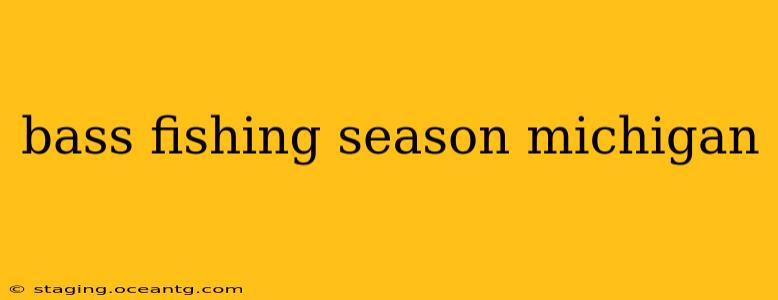Michigan, with its vast network of inland lakes and rivers, offers fantastic bass fishing opportunities. However, understanding the intricacies of Michigan's bass fishing season is crucial for a successful and legal angling experience. This guide delves into the specifics, addressing common questions and providing valuable insights for both seasoned anglers and newcomers.
What are the Bass Fishing Seasons in Michigan?
Michigan's bass fishing season is divided into distinct periods, varying slightly depending on the specific body of water and the species of bass targeted. Generally, the open season for largemouth and smallmouth bass is from the last Saturday in May until September 30th. However, there are exceptions and specific regulations that anglers need to be aware of. It is absolutely critical to check the Michigan Department of Natural Resources (DNR) website for the most up-to-date and precise regulations for your chosen fishing location. These regulations can change, and staying informed prevents unintentional violations.
What are the size and creel limits for bass in Michigan?
Size and creel limits are also crucial aspects of bass fishing regulations. These limits are designed to protect bass populations and ensure sustainable fishing for years to come. In most cases, you'll find a minimum size limit, meaning you cannot keep bass smaller than a certain length. There's also a creel limit, specifying the maximum number of bass you can legally possess at any time. These limits vary by water body and bass species, so always consult the official DNR resources for the precise rules applying to your chosen location before heading out. Failure to adhere to these regulations can lead to significant fines.
Are there different regulations for different lakes or rivers?
Yes, absolutely. Michigan boasts a diverse range of aquatic environments, each with its unique characteristics and fish populations. Consequently, bass fishing regulations can differ significantly between lakes and rivers. Some waters may have more restrictive size or creel limits, or even different open seasons. For example, a specific lake might have a shorter season to protect a particularly vulnerable bass population. Checking the DNR's online resources, specifically their interactive map detailing fishing regulations by location, is essential before you cast your line.
What are the best times to fish for bass in Michigan?
The best time to fish for bass in Michigan depends on several factors, including water temperature, weather conditions, and the specific species you're targeting. Generally, dawn and dusk are considered prime times, as bass are most active during these periods of low light. However, warmer days often yield good results throughout the day. Understanding bass behavior and feeding patterns can significantly improve your chances of a successful catch. Experiment with different times and techniques to discover what works best in your chosen location and during the current season.
What types of bass are found in Michigan?
Michigan is home to several bass species, including the largemouth bass, smallmouth bass, and spotted bass. Largemouth bass are typically found in shallower, weedy areas, while smallmouth bass prefer clearer, rocky areas with currents. Understanding the preferred habitats of each species can help you target your fishing efforts more effectively. Each species also displays slightly different behaviors, influencing your choice of lure and fishing techniques.
Where can I find more information on Michigan bass fishing regulations?
The most reliable source of information on Michigan bass fishing regulations is the official website of the Michigan Department of Natural Resources (DNR). Their website provides detailed maps, regulations, and frequently asked questions to ensure you have all the information you need before heading out for a fishing trip. Familiarize yourself with their resources to stay informed about any changes or updates in regulations. This is crucial to ensuring you're fishing legally and responsibly.
Remember, responsible and sustainable fishing practices are paramount. Adhering to regulations, practicing catch-and-release when appropriate, and respecting the environment are essential for preserving Michigan's fantastic bass fishing resources for future generations. Enjoy your fishing trip!
